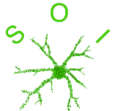Published
- Gilbert, O.M. 2020. Natural reward drives the advancement of life. Rethinking Ecology 5: 1-35. (Highlighted on Phys.org, Eurakalerts, Unfold Times, FloridaNewsTimes, LaboratoryNewsUK, Reddit, and Evolution News).
- Gilbert, O.M. 2019. Natural reward as the fundamental macroevolutionary force. arXiv preprint arXiv:1903.09567 (downloaded by 40+ countries on Academia.edu).
- Gilbert, O.M. 2018. Altruism or association? Proceedings of the National Academy of Sciences of the United States of America. 115:E3069-E3070 (comment on Wang and Lu 2018).
- Gilbert, O. M. 2017. Association theory: a new framework for analyzing social evolution. BioRxiv doi: https://doi.org/10.1101/197632.
- Gilbert, O. M. 2015. Microscale kin discrimination in a famous soil bacterium. Proceedings of the National Academy of Sciences of the United States of America. 112: 13757-8 (comment on Stefanic et al. 2015).
- Gilbert, O. M. 2015. Histocompatibility as adaptive response to discriminatory within-organism conflict: a historical model. American Naturalist. 185:2. 228-242.
- Gilbert, O. M. 2012. Kuzdzal-Fick, J. J., Queller, D.C., and Strassmann, J.E. Mind the gap: a comparative study of migratory behavior in social amoebae. Behavioral Ecology and Sociobiology. 66:1291–1296.
- Gilbert, O. M. 2012. Strassmann, J.E, and Queller, D.C. High relatedness in a social amoeba: the role of kin-discriminatory segregation. Proceedings of the Royal Society B. 279: 2619-2624.
- Strassmann, J. E., Gilbert, O. M. and Queller, D. C. 2011. Kin discrimination and cooperation in microbes. Annual Review of Ecology, Evolution, and Systematics. 65: 349-367.
- Gilbert, O. M., Queller, D. C., and Strassmann, J. E. 2009. Discovery of a large clonal patch of a social amoeba: implications for social evolution. Molecular Ecology. 18:6 1273-1281. (Yoon, C. Oozing through the Texas soil, a team of amoebae billions strong. The New York Times. March 24 edition [2007]; NPR radio, Science Daily; cited in Bourke, A. Principles of Social Evolution [2011] and The Wall Street Journal, March 10, 2014).
- Gilbert, O. M., Foster, K. R., Mehdiabadi, N. J., Strassmann J. E. and Queller, D. C. 2007. High relatedness maintains multicellular cooperation in a social amoeba by controlling cheater mutants. Proceedings of the National Academy of Sciences of the United States of America. 104:21, 8912-8917. (Goymer, P. Cheating gets you nowhere. Nature Reviews Genetics. 8.7 [2007]; Science Daily; cited in Bourke, A. Principles of Social Evolution [2011] and Krebs, Davies and West, An Introduction to Behavioral Ecology, 4th ed., pp. 310-311 [2012]).
- Gilbert, O. M. and Buskey, E. J. 2005. Turbulence decreases the hydrodynamic predator sensing ability of the calanoid copepod Acartia tonsa. Journal of Plankton Research. 27:10, 1067-1071.
Under review
The evolution of kin recognition (at Biological Reviews).
Under Revision
Planned capitalism for science (confidential).
